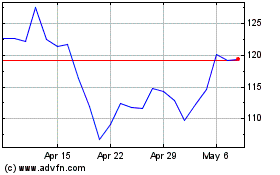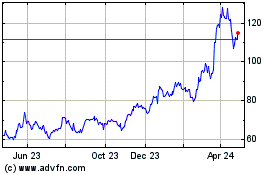Chip Companies Push For Tariff Bans On Complex Semiconductors
May 25 2012 - 9:35AM
Dow Jones News
SARATOGA SPRINGS, N.Y. (Dow Jones)-Global semiconductor
companies agreed to request tariff bans on chips that pack many
capabilities into one small package, something that would help them
better compete in the global marketplace.
Semiconductor CEOs and other representatives met in upstate New
York this week for their annual World Semiconductor Council
meeting. The group included representatives from various U.S.
companies such as Micron Technology Inc. (MU) and Analog Devices
Inc. (ADI), as well as companies from Europe, China, Taiwan, Korea
and Japan.
The organization gathers high-level executives once a year to
discuss trade policy, intellectual-property law and other
regulations that affect the entire industry. The companies seek to
reach agreements as a group that they then recommend to their
respective governments.
The biggest issue that the companies agreed on was seeking a ban
on import taxes for what the group dubbed "multicomponent chips."
As semiconductor technology becomes more advanced, chip designers
seek to include more functionality in one complete package, such as
processing, memory and sensing capabilities. That reduces cost and
typically makes it easier for customers to create their products.
Such chips are common in smartphones, tablets, PCs and other
consumer devices.
The topic was discussed at a roundtable late Thursday hosted by
the chief executives of Micron, Freescale Semiconductor Holdings I
Ltd. (FSL) and contract chip manufacturer Globalfoundries, along
with the chairman of Analog Devices and the president of the
Semiconductor Industry Association.
Freescale Chief Executive Rich Beyer said campaigns by the WSC
have helped eliminate most global tariffs on semiconductors, but
some nations impose steep taxes on the chips that combine many
functionalities in one package.
"Some of these tariffs are as much as 10%, which could eliminate
the ability of companies outside of those nations to successfully
compete," Beyer said.
The companies also discussed encryption, seeking to ensure
specific nations don't force the industry to revel what steps are
taken by customers to encrypt data.
"Our customers will develop encryption that will sometimes be
put into the chips," Beyer said. "Some nations around the world
would like insights into that."
Other issues discussed include regional stimulus and bailout
provisions, anti-counterfeiting efforts, and greenhouse gas
emissions and chemicals management.
Micron Chief Executive Mark Durcan said some incentives to buoy
companies can be positive, but government action at the point of
company failure can "create significant disruptions and damage to
the industry as a whole."
"There's not a lot of consensus on how that should be
addressed," he said. Durcan said the group will discuss the topic
in future sessions, noting it took about seven years to reach
agreement about tariffs for chips that include many capabilities in
one package.
The WSC hosted the meeting near the site for a recently
constructed Globalfoundries chip factory in Malta, N.Y. The
factory, along with university efforts in semiconductor research,
has earned the region the moniker of "Tech Valley."
-By Shara Tibken, Dow Jones Newswires, 212-416-2189,
shara.tibken@dowjones.com
Micron Technology (NASDAQ:MU)
Historical Stock Chart
From Aug 2024 to Sep 2024

Micron Technology (NASDAQ:MU)
Historical Stock Chart
From Sep 2023 to Sep 2024
